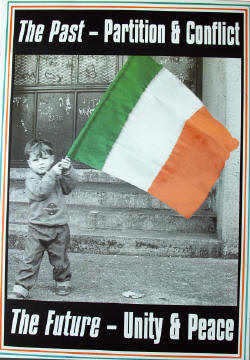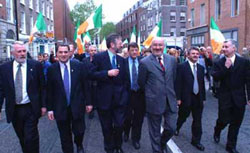 |
Irisch
Republikanische Solidarität
|
 |
IRELAND'S BLITZ
Today is the 30th anniversary of the Dublin and Monaghan
bombings, the worst single day of the recent conflict in
Ireland, and there have been fresh appeals for a probe of the
involvement of the British Crown forces.
Thirty-four people died on Talbot Street, Parnell Street, and
Nassau Street in Dublin, and in Monaghan town, on May 17th,
1974.
The Justice for the Forgotten group, which includes most of
those injured and bereaved in the attacks, called on the Dublin
government to put more pressure on the British government to
co-operate with a public inquiry into the bombings.
Speaking at a memorial service on Dublin's Talbot Street,
chairwoman for the campaign Bernie McNally said that the inquiry
had been sidelined for too long.
"The Irish Government have got to carry out their duty in a
responsible way and pressurise Tony Blair to conform," said Ms
McNally, a survivor of the bombings.
In her address to the assembled crowd - comprising survivors,
family members of the deceased, and trade unionists - Ms McNally
labelled Tony Blair a "hypocrite" as he claims to be wiping
out
terrorism, while he ignores the plight of those affected by the
bombings.
Wreaths were laid at the memorial statue, to the music of a lone
piper.
Wary of the public resentment at the failure to hold a full
international inquiry into the attacks, the Irish Prime
Minister, Taoiseach Bertie Ahern, fielded questions from the
press and members of the campaign.
He admitted that it was hard to believe that the British had no
information on the attacks, which is widely believed to have
involved members of the British security forces.
"We have done substantial work over the last five years and we
have to keep at it," Mr Ahern said. "We could be here having
an
inquiry but 49 of the top 50 people we want couldn't come, so we
wouldn't actually achieve anything".
Yesterday, the President, Mrs McAleese, officially dedicated a
memorial pillar to the seven people killed in the bombing in
Monaghan town.
The 20-foot high bronze and sandstone sculpture was designed by
Dublin artist Ciaran O Cearnaigh.
The dedication ceremony was attended by a crowd of almost 2,000
people, including relatives of the Dublin and Monaghan victims.
The names of the victims of not only the 1974 bombings, but also
the Dublin bombings of 1972 and loyalist attacks on towns along
the Border in the same period, were read out.
The stories of all those affected by the blitz-like attacks were
remembered today in media coverage of the events.
The family of Anne Byrne, a Donaghmede housewife, did not
realise how many lives had been affected by the attacks until
they attended a ceremony to mark the 25th anniversary of the
bombings.
Mrs Byrne, aged 35, was killed on Talbot Street while on a
shopping trip.
Her daughter Michelle O'Brien remembers hearing the bombs going
off and being told by a neighbour that they sounded like gas
explosions.
"Our father tried very hard to shelter us from what happened, so
it wasn't until the 25th anniversary that we realised that we
weren't the only ones affected," she said.
"My father always found it too hard to talk about my mother's
death. It's still tough.
"I remember that she loved her home - we'd only moved there two
years earlier and she was just like any other mother."
Edward John O'Neill, a 39-year-old self-employed decorator, was
with two sons were on Parnell Street when the first no-warning
bomb exploded.
Edward junior, now aged 34, remembers his father instinctively
turning to shield the boys, allowing his own body to take the
full force of the blast.
Mr O'Neill died at the scene, while the children both suffered
serious injuries.
Three months after the attack, Mrs O'Neill gave birth to a
still-born daughter, named Baby Martha, who was buried alongside
her father.
Sinn Fein's Caoimhghin O Caolain said the dignity of the
survivors and the bereaved was an inspiration.
"Sadly, 30 years on, the British government has yet to admit any
responsibility for the bombings. It continues to withhold
information on the role of its forces in the atrocity. It
treated the inquiry of Justice Barron with contempt.
"The surviving members of the Fine Gael/Labour coalition
Government of 1974 owe an explanation to the Irish people on why
they turned a blind eye to the involvement of a foreign
government in the worst bombings of the conflict which were
intended to kill as many civilians as possible.
"Members of successive governments also need to answer that
question."
Letzte Änderung:
20-Mai-04